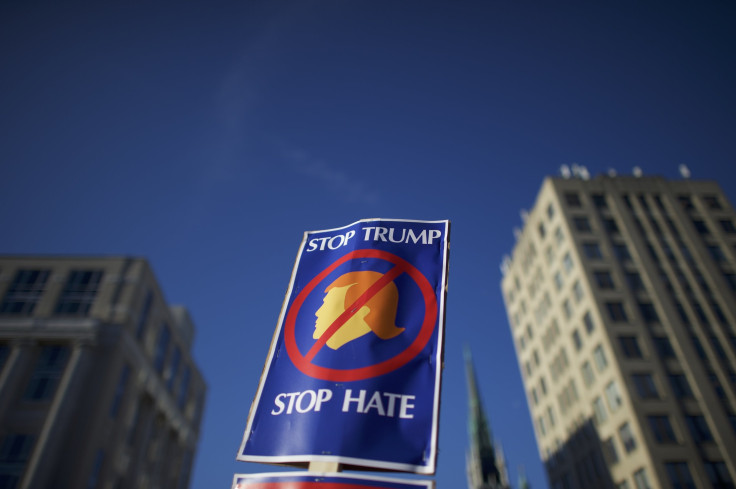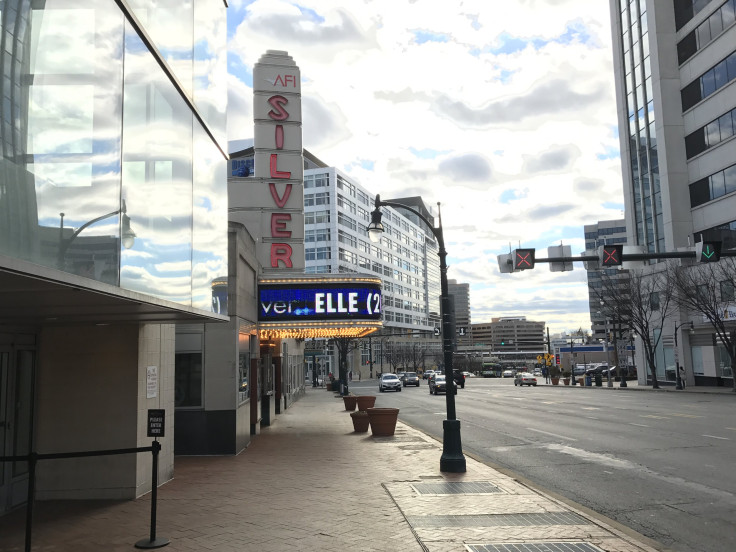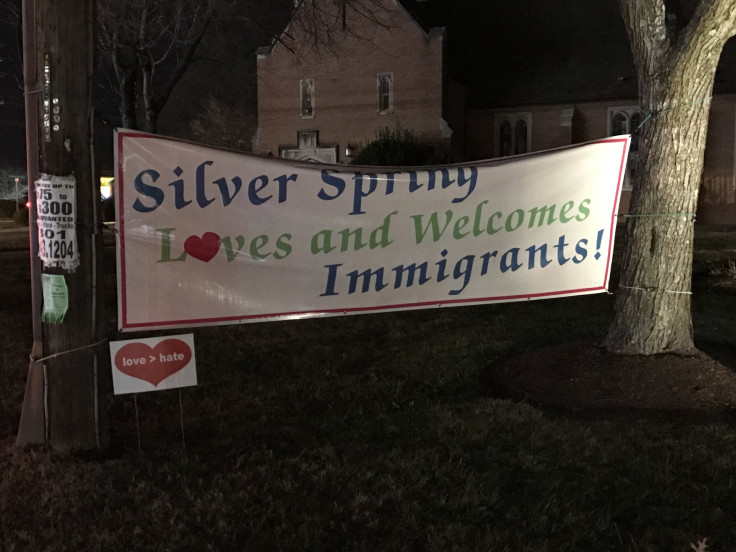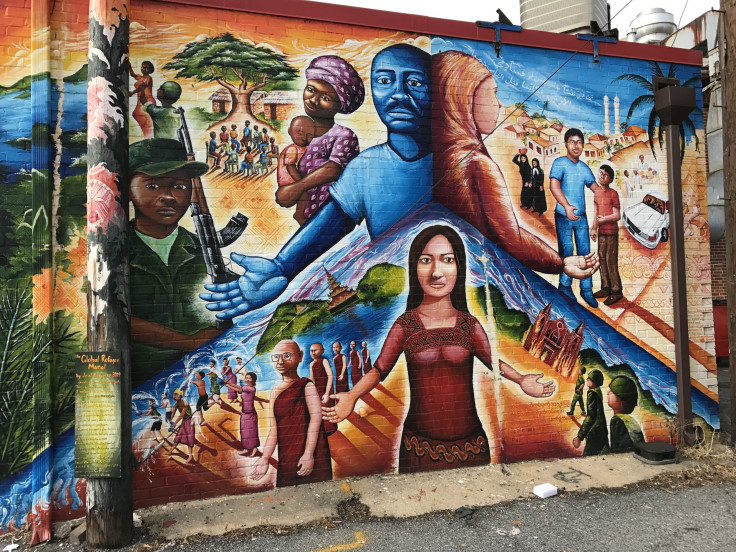Is America Racist? Under Donald Trump, Liberal Maryland Town Battles Hate Crimes, Prejudice Toward Immigrants, Blacks

SILVER SPRING, Maryland-- The Rev. Jeffrey O. Thames Sr. can pinpoint the exact moment his view of his adopted hometown started to change. During a 2014 run for a county councilman position, he spoke at a public forum downtown. Thames, who is black, was running against two white men.
After the event, a white man casually walked up to Thames. "We'll never vote for a black boy when we have a white man to choose from," Thames recalled the man saying.
Thames didn't win the election.
"It opened my eyes to let me know there was undercurrent of racism in Montgomery County that we thought was done away with," Thames told International Business Times on a recent afternoon. The 38-year-old now works as an activist and is the president of Hope Restored, a non-profit organization that works with the homeless, the formerly incarcerated and victims of hate crimes, among others.
Silver Spring, Maryland, one of the United States' most diverse towns, is a vision of what many people imagine America might look in the future. With rapidly shifting demographics and a large immigrant community, the town nestled firmly in the so-called liberal bubble has largely embraced its diversity. But since the election of Donald Trump — who is slated to officially take over the presidency Friday during an inauguration ceremony in D.C., some six miles away, there are new concerns that old resentments over race and culture are bubbling to the surface.
Thames described a need to come together for action, which could include working with the new administration.
"We have to adjust," he said. "Conversations left undone can cause a lot of people to hurt."

Silver Spring has transformed in recent years, rife with what sociologists call "global neighborhoods," meaning there is representation from just about every spot on the globe. Ethnic minorities make up the majority of the population, and from the 2000 Census to the 2010 census, the Hispanic population alone increased some 17 percent. The latest Census data showed the town of some 70,000 is about 46 percent white, 28 percent black or African-American, 26 percent Hispanic or Latino, 8 percent Asian and 13 percent "some other race." There's an especially large Ethiopian population in town and many recent immigrants from Central America.
Wander through Silver Spring's downtown and its diversity is clear. If you're hungry, the main strip has Ethiopian food, Italian, Greek, Chinese, Thai, Jamaican, and, of course, ubiquitous chains like Red Lobster or upscale bars serving popular farm-to-table style cuisine. Silver Spring was rated the fourth-most diverse city in the country in a Wallethub study, alongside a handful of other Montgomery County cities that made the list.
The Rev. Robert Harvey said he's seen Silver Spring grow increasingly more diverse in his decade at the Episcopal Church of Our Saviour. He said some 80 percent of his congregation are immigrants and at any given service about 52 countries are represented. That's why Harvey felt particularly targeted when his church was the subject of a hate crime.
In November, a few days after the election, the church's Spanish-language banner was slashed, the words "Trump Nation, Whites Only" scrawled on it. The same message was painted on a memorial wall outside the church. In the wake of a stunning election, the news spread slowly throughout the Mid-Atlantic, then to the national scene, then eventually internationally, with a BBC News reporter calling the reverend for comment at one point.
Harvey told IBT Trump's campaign played on people's "worst fears and sins" and that the U.S.' next president "foments that racial hatred." Trump made frequent controversial statements about immigrants, promoted a ban on Muslims entering the country and was embraced by the so-called alt-right, which is popular among white nationalists and neo-Nazis. In Montgomery County, meanwhile, 76 percent of the population voted for Democratic candidate Hillary Clinton, the liberal, pro-immigrant candidate. But even a diverse, left-leaning enclave is not without hatred.
"Racism affects all of us. It's a condition of the human heart," Harvey said, speaking in the offices of the church.

Two days after the election, just before his church was vandalized, Harvey said he saw an older Latina woman crossing the road outside of Our Saviour near a store frequented by the immigrant population. Two "big white guys" were haranguing her, Harvey said, yelling: "This is Trump nation, you need to go back to Mexico." Not dressed in his collar, he scared the men off, telling them to stop, while reaching for his phone to call 911.
Two Muslim women who saw the scene play out told Harvey, "It's almost as if they were positioned there to target anyone who didn't look like them." Soon after, the church was vandalized.
The hate crime brought a flood of support: A new, pro-immigrant banner appeared on the lawn, a local Muslim community center sent some 550 supportive cards signed by children and other synagogues/churches have planned interfaith events and services. But many parishioners are frightened and Harvey knows there's longstanding issues resurfacing they have to tackle. Over the past decade, as the population of Silver Spring changed, and his church's membership shifted in lockstep, Harvey saw how folks can react, even in a town that has long taken pride in diversity. A woman, who was a member of the church at the time, asked him, "Robert what are you going to do to attract more white people?"
"What do you say to a question that dumb?" Harvey said. He told her that Jesus preached acceptance. The woman and her family eventually left the church.

Other residents have also described fear and violence since Trump's victory. Seble Lemme, a 42-year-old Ethiopian immigrant who cooks at Lucy Ethiopian Restaurant in downtown Silver Spring, said, "to be honest, people are afraid."
"I'm scared too, but I'm not scared the way people get crazy," she said, citing her faith in God.
She came to Silver Spring some two decades ago and believes God can turn pain into "a good hurt." All of her family voted for Clinton, but she preached being patient.
Students in local high schools, meanwhile, have spoken out against Trump ahead of the inauguration. Hundreds of children in Montgomery County schools, including Silver Spring's Montgomery Blair High School, staged a post-election walkout, chanting "no hate, no fear, immigrants are welcome here."
Derek Turner, spokesman for Montgomery County Public Schools, told IBT they were "closely monitoring" the local increase in hate crimes. "Students should feel safe and welcome at our schools … without fear," Turner said.
Matt Braddock, a 46-year-old pastor at the Christ Congregational Church, has used his Silver Spring house of worship as a clearinghouse of sorts for folks to report hate incidents. He told IBT there has been a sharp uptick after the election, including local schools seeing drawings of swastikas and threats to African Americans. The night of the election, a banner at his church reading "Black Lives Matter," was defaced. It was one of the first instances of a number of similar incidents in the immediate aftermath of the election, the Southern Poverty Law Center counting nearly 900 incidences of hateful harassment in the ten days after Nov. 8.
Braddock's church has a largely white congregation and has long promoted a progressive agenda, including acceptance for the LGBT community. Although the sign had been defaced before, the election night vandalism of the sign felt different, like "a desecration," Braddock said. It felt like folks with simmering resentments now had permission to act out. Like Harvey, Braddock saw an outpouring of support from some locals. To him, that may be the answer ahead of a Trump administration.
"I'm becoming more and more convinced that our response to national events has to be more local," Braddock said, calling for an increase in dialogue and reaching out to folks who need to be protected.

County Councilmember George Leventhal told IBT there was only so much he could do as a local elected official under Trump, whom he slammed for stoking hatred.
"We are in a time of backlash. People of good will need to stand up," he said. "I've been to a lot of meetings, seeing a lot of earnest liberals looking for communities to protect."
Of course, there are others who are more ambivalent. Stephen Singh, a 37-year-old whose family came to Silver Spring from Guyana when he was 10, said he was glad Trump won, but he didn't vote in the election. Speaking with the distinct accent found only in the U.S.' Mid-Atlantic region, he said didn't like Clinton, and all the racial stuff would "blow over."
"Do American stuff ... live your routine," he said. "I don't see people looking at me differently."
As Kris Strkna walked Thursday along one of Silver Spring's main streets downtown, surrounded by chains like Starbucks and Potbelly, the 52-year-old mother was less positive, concerned by the recent local incidents. It was just one day before Trump would become president and her worry was audible, her tone flat and tired.
"I hope that Americans' better nature will prevail," she said.
© Copyright IBTimes 2024. All rights reserved.





















